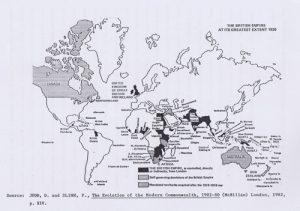American Anti-Colonialism, and the Liquidation of the British Empire.
However, by the turn of the century, this cheapness turned into a horrifying escalation in costs. “A 90-gun warship of the mid-century could cost as little as £100,000; the ‘Majestic’ class battleships of 1893-5 cost around £1 million each; the ‘Queen Elizabeth’ class battleships of 1912-13 cost around £2.5 million.”26 Therefore, the more costly the armaments became, the more countries would be forced to abandon the race of being a great power and Britain was no exception. Having interests in every part of the world, the British government became increasingly under pressure “to consider which region had priority and in which it might be necessary to give way gracefully since it was appreciated that if Britain concentrated too much in one region, she would have no strength to protect the others.”27
Nevertheless, as it has been said, the decline of the United Kingdom’s economic, colonial and strategic superiority remained invisible for a long period. The county’s resources, in particular its accumulated overseas holdings, were enormous up to 1914; its diplomatic flexibility offered a good prospect against a global disaster from an overwhelming foreign coalition; and the decline was relative not absolute.
Impacts of Two World wars on the British Empire
“The British ULTIMATUM to Germany on the 4th August 1914 committed the whole British Empire to war on the sole authority of the government in London. With Ireland on the verge of civil war, India in a state of ferment and the Dominions maturing as individual nations, it seemed to the Germans that the British Empire had come to the brink of dissolution and that a British declaration of war would push it over.”28
Despite the past experiences, the Germans still failed to realise that Britain would make all efforts to defend itself. As we have already said, “being a small island Kingdom lying close to the continent of Europe where from time to time through modern history, great military powers had arisen that would have overwhelmed her, had they been able to transport their land forced across the narrow intervening area of the sea,”29 Britain had to maintain the following general principles of policy and strategy towards continental Europe:
- The Strategic Unity of the British Isles.
- The Command of the English Channel and the North Sea.
- The Independence of the Low Countries.
- The Balance of Power.”30
Great Britain sought to prevent any part of the British Isles, including Ireland, from passing into the control of another power. Second, the United Kingdom sought to commend the narrow seas which come between her and continental Europe. This is to control the maritime trade routes, to ensure that food supplies into the country from overseas will not be interrupted, and above all to prevent invasion. Thirdly, she sought to prevent the coast of continental Europe opposite the Thames estuary, particularly the mouth of the Scheldt and Rhine, from passing into the control of hostile power. Finally, Great Britain sought to prevent any continental European power from acquiring the undisputed hegemony, which endanger the independence of the Low Countries and might result in a Continental coalition against her.



